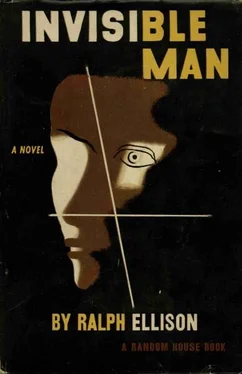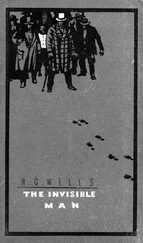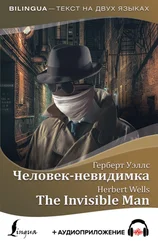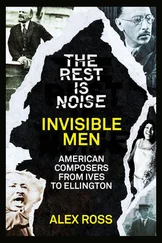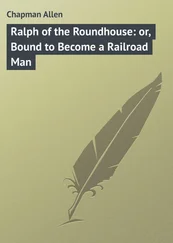Ralph Ellison - Invisible man
Здесь есть возможность читать онлайн «Ralph Ellison - Invisible man» весь текст электронной книги совершенно бесплатно (целиком полную версию без сокращений). В некоторых случаях можно слушать аудио, скачать через торрент в формате fb2 и присутствует краткое содержание. Год выпуска: 1995, ISBN: 1995, Издательство: Vintage Books, Жанр: Классическая проза, на английском языке. Описание произведения, (предисловие) а так же отзывы посетителей доступны на портале библиотеки ЛибКат.
- Название:Invisible man
- Автор:
- Издательство:Vintage Books
- Жанр:
- Год:1995
- ISBN:9780679732761
- Рейтинг книги:4 / 5. Голосов: 1
-
Избранное:Добавить в избранное
- Отзывы:
-
Ваша оценка:
- 80
- 1
- 2
- 3
- 4
- 5
Invisible man: краткое содержание, описание и аннотация
Предлагаем к чтению аннотацию, описание, краткое содержание или предисловие (зависит от того, что написал сам автор книги «Invisible man»). Если вы не нашли необходимую информацию о книге — напишите в комментариях, мы постараемся отыскать её.
The Waste Land,
Invisible man — читать онлайн бесплатно полную книгу (весь текст) целиком
Ниже представлен текст книги, разбитый по страницам. Система сохранения места последней прочитанной страницы, позволяет с удобством читать онлайн бесплатно книгу «Invisible man», без необходимости каждый раз заново искать на чём Вы остановились. Поставьте закладку, и сможете в любой момент перейти на страницу, на которой закончили чтение.
Интервал:
Закладка:
I could see the girl's face still, below the short flight of stairs. But who was the figure that had crossed the roof behind me? Chased me? Why had he been so silent, and why was there only one? Yes, and why hadn't they sent a patrol car to pick me up? I hurried out of the block of funeral parlors into the bright sun that swept the snow of the avenue, slowing to a leisurely walk now, trying to give the impression of a complete lack of haste. I longed to look stupid, utterly incapable of thought or speech, and tried to shuffle my feet over the walk, but quit with distaste after stealing a glance behind me. Just ahead I saw a car pull up and a man leap out with a physician's bag.
"Hurry, Doctor," a man called from the stoop, "she's already in labor!"
"Good," the doctor called. "That's what we've been waiting for, isn't it?"
"Yeah, but it didn't start when we expected it."
I watched them disappear inside the hall. What a hell of a time to be born, I thought. At the corner I joined several people waiting for the lights to change. I had just about convinced myself that I had escaped successfully when a quiet, penetrating voice beside me said, "That was a masterful bit of persuasion, brother."
Suddenly wound tight as a tensioned spring I turned almost lethargically. A short insignificant-looking bushy-eyebrowed man, with a quiet smile on his face stood beside me, looking not at all like a policeman.
"What do you mean?" I asked, my voice lazy, distant.
"Don't be alarmed," he said, "I'm a friend."
"I've got nothing to be alarmed about, and you're no friend of mine."
"Then say that I'm an admirer," he said pleasantly.
"Admirer of what?"
"Of your speech," he said. "I was listening."
"What speech? I made no speech," I said.
He smiled knowingly. "I can see that you have been well trained. Come, it isn't good for you to be seen with me in the street. Let's go somewhere for a cup of coffee."
Something told me to refuse, but I was intrigued and, underneath it all, was probably flattered. Besides, if I refused to go, it would be taken as an admission of guilt. And he didn't look like a policeman or a detective. I went silently beside him to a cafeteria down near the end of the block, seeing him peer inside through the window before we entered.
"You get the table, brother. Over there near the wall where we can talk in peace. I'll get the coffee."
I watched him going across the floor with a bouncy, rolling step, then found a table and sat watching him. It was warm in the cafeteria. It was late afternoon now only a few customers were scattered at the tables. I watched the man going familiarly to the food counter and ordering. His movements, as he peered through the brightly lighted shelves of pastry, were those of a lively small animal, a fyce, interested in detecting only the target cut of cake. So he's heard my speech; well, I'll hear what he has to say, I thought, seeing him start toward me with his rapid, rolling, bouncy, heel-and-toey step. It was as though he had taught himself to walk that way and I had a feeling that somehow he was acting a part; that something about him wasn't exactly real -- an idea which I dismissed immediately, since there was a quality of unreality over the whole afternoon. He came straight to the table without having to look about for me, as though he had expected me to take that particular table and no other -- although many tables were vacant. He was balancing a plate of cake on top of each cup, setting them down deftly and shoving one toward me as he took his chair.
"I thought you might like a piece of cheese cake," he said.
"Cheese cake?" I said. "I've never heard of it."
"It's nice. Sugar?"
"Go ahead," I said.
"No, after you, brother."
I looked at him, then poured three spoonfuls and shoved the shaker toward him. I was tense again.
"Thanks," I said, repressing an impulse to call him down about the "brother" business.
He smiled, cutting into his cheese cake with a fork and shoving far too large a piece into his mouth. His manners are extremely crude, I thought, trying to put him at a disadvantage in my own mind by pointedly taking a small piece of the cheesy stuff and placing it neatly into my mouth.
"You know," he said, taking a gulp of coffee, "I haven't heard such an effective piece of eloquence since the days when I was in -- well, in a long time. You aroused them so quickly to action. I don't understand how you managed it. If only some of our speakers could have listened! With a few words you had them involved in action! Others would have still been wasting time with empty verbiage. I want to thank you for a most instructive experience!"
I drank my coffee silently. Not only did I distrust him, I didn't know how much I could safely say.
"The cheese cake here is good," he said before I could answer. "It's really very good. By the way, where did you learn to speak?"
"Nowhere," I said, much too quickly.
"Then you're very talented. You are a natural. It's hard to believe."
"I was simply angry," I said, deciding to admit this much in order to see what he would reveal.
"Then your anger was skillfully controlled. It had eloquence. Why was that?"
"Why? I suppose I felt sorry -- I don't know. Maybe I just felt like making a speech. There was the crowd waiting, so I said a few words. You might not believe it, but I didn't know what I was going to say ..."
"Please," he said, with a knowing smile.
"What do you mean?" I said.
"You try to sound cynical, but I see through you. I know, I listened very carefully to what you had to say. You were enormously moved. Your emotions were touched."
"I guess so," I said. "Maybe seeing them reminded me of something."
He leaned forward, watching me intensely now, the smile still on his lips.
"Did it remind you of people you know?"
"I guess it did," I said.
"I think I understand. You were watching a death --"
I dropped my fork. "No one was killed," I said tensely. "What are you trying to do?"
" A Death on the City Pavements -- that's the title of a detective story or something I read somewhere ..." He laughed. "I only mean meta-phor-ically speaking. They're living, but dead. Dead-in-living ... a unity of opposites."
"Oh," I said. What kind of double talk was this?
"The old ones, they're agrarian types, you know. Being ground up by industrial conditions. Thrown on the dump heaps and cast aside. You pointed it out very well. 'Eighty-seven years and nothing to show for it,' you said. You were absolutely correct."
"I suppose that seeing them like that made me feel pretty bad," I said.
"Yes, of course. And you made an effective speech. But you musn't waste your emotions on individuals, they don't count."
"Who doesn't count?" I said.
"Those old ones," he said grimly. "It's sad, yes. But they're already dead, defunct. History has passed them by. Unfortunate, but there's nothing to do about them. They're like dead limbs that must be pruned away so that the tree may bear young fruit or the storms of history will blow them down anyway. Better the storm should hit them --"
"But look --"
"No, let me continue. These people are old. Men grow old and types of men grow old. And these are very old. All they have left is their religion. That's all they can think about. So they'll be cast aside. They're dead, you see, because they're incapable of rising to the necessity of the historical situation."
"But I like them," I said. "I like them, they reminded me of folks I know down South. It's taken me a long time to feel it, but they're folks just like me, except that I've been to school a few years."
He wagged his round red head. "Oh, no, brother; you're mistaken and you're sentimental. You're not like them. Perhaps you were, but you're not any longer. Otherwise you'd never have made that speech. Perhaps you were, but that's all past, dead. You might not recognize it just now, but that part of you is dead! You have not completely shed that self, that old agrarian self, but it's dead and you will throw it off completely and emerge something new. History has been born in your brain."
Читать дальшеИнтервал:
Закладка:
Похожие книги на «Invisible man»
Представляем Вашему вниманию похожие книги на «Invisible man» списком для выбора. Мы отобрали схожую по названию и смыслу литературу в надежде предоставить читателям больше вариантов отыскать новые, интересные, ещё непрочитанные произведения.
Обсуждение, отзывы о книге «Invisible man» и просто собственные мнения читателей. Оставьте ваши комментарии, напишите, что Вы думаете о произведении, его смысле или главных героях. Укажите что конкретно понравилось, а что нет, и почему Вы так считаете.
